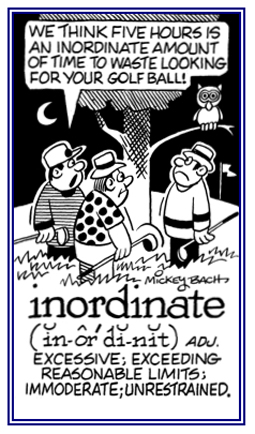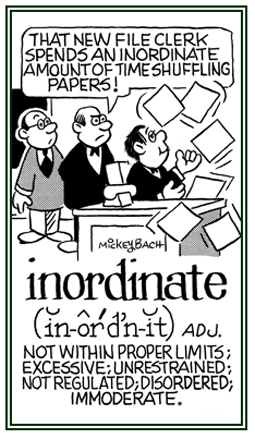ord-, ordinato-, -ordin-, -ordinate, -ordinating, -ordinated
(Latin: order, in order; in a row, regular series, class, rank)
1. In geography, the location on a map of a site based on the intersection of latitude and longitude markings: The navigator used the coordinates he received from the supervisor to locate the long lost silver mine high in the mountains.
2. An assortment of clothing, including shoes, hose, etc. that are designed to compliment and to look well together when they are worn: The store was advertising skirt and sweater coordinates at a great price for the fall season just in time for students to buy stylish outfits.
2. An assortment of clothing, including shoes, hose, etc. that are designed to compliment and to look well together when they are worn: The store was advertising skirt and sweater coordinates at a great price for the fall season just in time for students to buy stylish outfits.
coordinate, co-ordinate (verb), coordinates, co-ordinates; coordinated, co-ordinated; coordinating, co-ordinating
To organize an activity in such a manner as to be well structured and functioning in a logical manner: Carol will be coordinating the work of the volunteers at the speaking event next week.
coordinately, co-ordinately (adverb); more coordinately, more co-ordinately; most coordinately, most co-ordinately
Pertaining to doing something in a manner that is harmonious, encourages order, and results in a compatible situation for working together: The clerk worked conscientiously and coordinately to organize the files in the law office that had become disorganized and messy.
An equal rank, a peer, or an equivalent: The landlord was happy with the sense of coordinateness that he felt with the tenants who lived in his apartment building.
1. A smooth functioning of the movements of the arms and legs of the body: The audience applauded at the coordination of the gymnast who was performing high above the floor of the circus tent without a safety net.
2. Etymology: from Latin coordinationem, from Latin coordinare, "to set in order, to arrange"; from com-. "together" + ordinatio, "arrangement".
2. Etymology: from Latin coordinationem, from Latin coordinare, "to set in order, to arrange"; from com-. "together" + ordinatio, "arrangement".
coordinative, co-ordinative (adjective); more coordinative, motr co-ordinative; most coordinative, most co-ordinative
Descriptive of grammatical or linguistic terminology: A conjunction, or linking word, that brings two words of identical rank or worth into one sentence; such as, "Peter, Nancy, and Heather walked down the street" where the word and serves as a coordinative, so the listing of the names are of equal relevance in the sentence.
A situation of confusion, lack of organization, or messiness: Alison realized that she could not work productively with the disorder on her desk; so, each day before going home, she tidied up her working area.
disorderly (adjective), more disorderly, most disorderly
Descriptive of that which is inadequate, confused, disturbed, higgledy-piggledy, or not working well: The marchers in the parade proceeded in a disorderly manner, sometimes walking on the sidewalk, other times cutting corners through the park.
extraordinarily (adverb), more extraordinarily, most extraordinarily
Characterizing how something is done in an unusual, unique, impressive, or surprising way: For a shy person, the speech that Dr. Miles gave at the convocation was extraordinarily long and filled with amusing anecdotes and stories about her years of doing research in the Canadian Arctic.
extraordinary (adjective), more extraordinary, most extraordinary
Descriptive of or characterized by being exceptional, remarkable, over the top, or amazing; The extraordinary circumstances of the first meeting of Jim's parents was the kind of experience you only expect to read about in romantic novels.
foreordain (verb), foreordains; foreordained; foreordaining
To arrange or to determine an event in advance of its happening: Successful authors foreordain the general outlines of their compositions well in advance of the actual writing of their work.
The shaman of the local group of aboriginal people foreordained that the next chief would come from the far north.
An action or an assignment that is made in anticipation of some future event: The king's councillors, fearing the interference of the pretender to the throne, announced the foreordainment of the queen as regent to the throne, if his majesty were to die.
foreordinate (verb), foreordinates; foreordinated; foreordinating
1. To appoint beforehand: The president of the university foreordinated a new dean in anticipation of the early retirement of the current dean at the end of the academic year.
2. To predetermine or to predestine: The fortune teller at the local medieval fair enjoyed foreordinating the marital bliss of young people who visited her booth.
2. To predetermine or to predestine: The fortune teller at the local medieval fair enjoyed foreordinating the marital bliss of young people who visited her booth.
Typically a theological term suggesting that the highest church authority has determined all aspects associated with the universe in anticipation of their actual occurrences: Many individuals who adhere to the strict and literal interpretation of spiritual writings believe in the foreordination of everything that happens throughout eternity by God.
inordinate (adjective), more inordinate, most inordinate
Going beyond what is normal, proper, or usual: The group had more inordinate difficulties completing the project on the date that was specified by their supervisor than they had ever had in the past.

© ALL rights are reserved.

© ALL rights are reserved.
Go to this Word A Day Revisited Index



